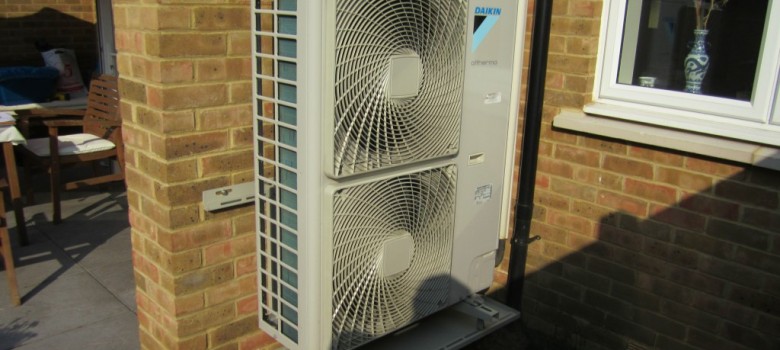
Now the Renewable Heat incentive has launched, we are going to take a look at the key differences between an air source heat pump and a ground source heat pump, to help you make a better informed investment decision!
A bit of background on heat pumps
Heat pumps are a fantastic way to create hot water in the home; they absorb heat from either the air or the ground (hence air source and ground source heat pump!) into a fluid. This fluid then gets compressed which drives up the temperature even further and a heat exchanger then transfers the heat from the liquid to water travelling around your heating system.
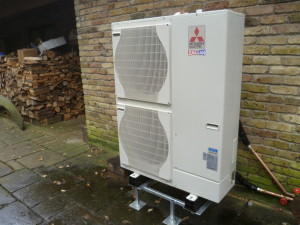 Electricity is traditionally considered the more expensive way to heat the home – one kWh of electricity costs 15p, while one kWh of gas costs only 4p. The thing with heat pumps though, is that unlike a traditional electric radiator that turns that 1kWh into one unit of useful heat, a heat pump converts 1kWh into 3.5 or more units of useful heat.
Electricity is traditionally considered the more expensive way to heat the home – one kWh of electricity costs 15p, while one kWh of gas costs only 4p. The thing with heat pumps though, is that unlike a traditional electric radiator that turns that 1kWh into one unit of useful heat, a heat pump converts 1kWh into 3.5 or more units of useful heat.
Therefore, electrically run heat pumps are actually a really efficient way to heat the home. However, because the extent of the hot water temperature produced by them is not as much as with a gas boiler, you need to ensure that your home is sufficiently insulated in order for the heat pump’s influence to become maximised.
However, if you are satisfied that your property is sufficiently insulated then the next question is, which to go for – a ground source heat pump or an air source heat pump?
Air source heat pump versus ground source heat pump
As mentioned previously, air source heat pumps absorb their heat from the air, while ground source heat pumps absorb it from the ground. In the following sections we will provide a comparison of the two technologies.
Cost of heat pumps
While the scientific basis between the two technologies is the same, the cost of having them installed is not! The cost of an air source heat pump (without considering underfloor heating) is approximately £7,500. A Ground source heat pump on the other hand is £23,000, with much of the additional cost going on bore hole that needs to be drilled – this could cost as much as £9,000 for a couple of (albeit very deep) holes in your back garden. If you have the space, you can lay the ground source heat pump piping not vertically down, but horizontally within a field, but this obviously requires a lot of space, which brings me nicely on to the next point.
Land Requirements of heat pumps
Air source heat pump units look very much like air conditioning units that you may have seen on office buildings. The size of the heat pump will be determined by your installer based on your homes heat demand – the bigger the home (+ the less insulated), the more heat it is going to require – so the larger the air source heat pump unit.
A typical unit might be a metre high by a meter wide with a depth of about half a meter. This will obviously vary greatly between models, but will give you something to work with!
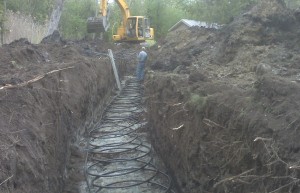 A ground source heat pump requires buried pipes in the garden, so the first consideration is whether or not you have a garden to lay them! If you want to put the pipes in vertically, bore holing machinery will need to be able to access the garden. In some cases even this might be a showstopper. Although, as said previously, while laying the pipework horizontally takes up a larger surface area of land, it is a cheaper method.
A ground source heat pump requires buried pipes in the garden, so the first consideration is whether or not you have a garden to lay them! If you want to put the pipes in vertically, bore holing machinery will need to be able to access the garden. In some cases even this might be a showstopper. Although, as said previously, while laying the pipework horizontally takes up a larger surface area of land, it is a cheaper method.
Efficiency of Air Source heat pumps vs. Ground Source Heat Pumps
There is one clear winner here – ground source heat pumps.
Firstly, consider what time of year you use most hot water in your home – the middle of the winter. It is then that the radiators are on at full whack and you have more hot baths and showers.
Secondly consider how a heat pump works – it takes heat from either the air or the ground, which warms a ‘working fluid’, which in turn gets compressed maximising the potential temperature.
Now, the higher the temperature of the air / ground, the easier the heat pump needs to work to get up it up to the required temperature. So in the summer, an air source heat pump will take in warm air (although not always in the UK!), and the heat pump will have to do very little to heat the water to the required temperature.
Conversely, consider the winter months, when there is a far higher demand for hot water. At this time of year, the air temperature is far lower, so the air source heat pump will need to work far harder to reach the required temperature.
With a GSHP, the pipes are running buried in the ground, where you don’t get the same temperature fluctuations as you do above ground – the ground is fixed at about 100C. This means that during the winter, when the air temperature is cooler and the ASHP will need to be working really hard, a comparative GSHP can provide the same hot water requirements off fewer units of electricity.
>>> The cost of heating your home with gas versus electricity <<<
The Coefficient of Performance of Heat Pumps
The coefficient of performance (CoP) is the ratio of heat delivered by the heat pump versus the electricity supplied to the compressor, so the bigger the CoP the better. For example, a heat pump with a CoP of 3 means that for every 3kWh of heat output, 1kWh of electricity is used to drive the heat pump.
Now as I have mentioned previously, the heat pump will need to work harder when it is colder, and less hard when it is warmer, so the CoP varies on a daily basis. Therefore, in order to compare different heat pumps it is best to look at the Seasonal Performance Factor, which is defined as the ratio of heat delivered by the heat pump versus the electricity supplied to the compressor over the heating season.
The Seasonal Performance Factor of Heat Pumps
For an air source heat pump you can assume a typical seasonal performance factor of 2.5 – 2.8. This takes into account that during the winter, the CoP will fall well below the 2.5 level, but during the summer it might be as high as 4.
For a ground source heat pump you can expect a typical season performance factor of about 4. That means that across the heating season, the GSHP will be much more efficient.
The financial reward of investing in a heat pump – the RHI
The Renewable Heat Incentive has now launched and has been introduced to reward early adopters of heat pumps with generous financial subsidies. The RHI for heat pumps are calculated by taking into account the heat demand for the property and the seasonal performance factor for that particular heat pump.
The RHI formula is calculated as per below:
1. Eligible Heat Demand = Total Annual Energy Demand x (1 – 1 / SPF)
2. Annual RHI = Eligible Heat Demand x RHI Tariff
However the RHI tariff for the GSHP is 18.8p / kWh, while for the ASHP it is just 7.3p / kWh. This is due to the up front cost of an ASHP, £7,500 and a GSHP, £23,000.
They have calculated that so by and large the RHI (at the initial rates – they will be reviewed downward on a quarterly basis) will cover the cost of the installation.
Final Thoughts – Ground Source versus Air Source Heat pumps
In summary, heat pumps are a very worthwhile financial investment (especially when you consider the renewable heat incentive), particularly if you don’t have access to mains gas.
Whether you opt for a ground source or air source heat pump is dependent on your situation, but to be honest as the technology improves there is very little in it – I guess it really depends on whether you can afford the additional expense of the GSHP for the increased efficiency – bearing in mind that the RHI at its current level should largely cover the install cost of both of the technologies.
Installing heat pumps
Are you thinking about getting a heat pump? We have scoured the country for the best tradespeople, so that we can make sure we only recommend those we really trust.
If you would like us to find you a local heat pump installer, just fill in the form below and we will be in touch shortly!
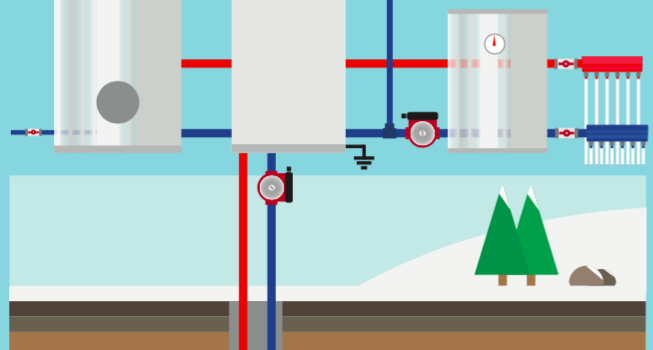





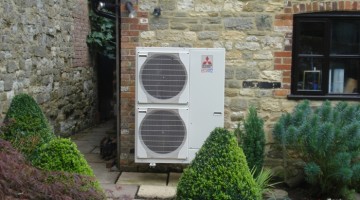






Was dead set air source till I read this. What is the usual manufacturers guarantee for a ground source heat pump system?
Martin, we install Vaillant Ground Source Heat Pumps. They come with a 3 year full guarantee and a 10 year guarantee on the compressor.
Are there any grants for heat pumps that help out pensioners?
Hi Tristan,
Unfortunately for heat pumps there are no grants to help with the initial install costs, however the RHI (renewable heat Incentive) is a subsidy paid every 3 months for 7 years. This payment should cover the total install cost of the heat pump over the 7 years.
Very good article. Some additional considerations with heatpumps, both ground source and air source, is the flow temperature of the distribution system; at a minimum you must use low temp radiators circa 55 degrees or the best solution is to use underfloor heating circa 45 degrees. If you design the UFH for heatpumps you can go as low as 35 degrees. The rooms are all still heated to 20 odd degrees. Low flow temp significantly improve heatpump (seasonal) COP to between 4 and 5. Also the way you heat a house with heatpumps is quite different, best results come from operating the heating 24/7, trickling heat in all the time. This is the main reason that heatpumps only work on properties that are extremely well insulated. If you use solar recharge, pumping spare solar heat down you ground source collector in the summer, you can possibly double you COP. All this means that heat pumps work well on new build but are difficult to retro fit. I think that £23,000 is rather high for the cost of a ground source system. I have seen 4 bed domestic systems installed for £12,000 for heat pump & collectors.
I agree, £23,000 is a little high. We’d install for somewhere around £15,000, plus the trenching. Also, the ASHP price there is a little low if you’re going to install a new unvented hot water cylinder as well, which you normally would.
Hi Mike, Leah – I am not sure I agree, it seems the borehole companies are charging about £7,000 per hole at the minute (it seems they are cashing in on the popularity of the RHI). I agree if you are just digging trenches then getting a heat pump installed is far cheaper – but in London, seldom to households have gardens big enough to lay the pipe work horizontally.
Pete – very interesting. It was the cost of boreholes that websites published that put me off going for the geothermal one. Do you know what the rates for borehole digging are north of the border? I live in a quiet town in the Clyde valley, but I am swaying air source or boiler with solar thermal system.
I was wondering which manufacturer make the best heatpumps. I am currently considering a Vaillant system or Mitsubishi (Ecodan)? Would appreciate any thoughts!
They are both good makes. Watch out that you get an MCS accredited installer. Both those makes also only allow their heat pumps to be installed by installers who have been on the company training programme and are MCS. Check out the Microgeneration Certification website to find one.
Great article. I live in a rural village without mains gas. I currently heat the house and the AGA off oil. The house is over 300 years old (an therefore not very well insulated). Solar would be nice as we have a south facing roof, but it would ruin the cottage period character (property frontage). We have a big garden, but would not want to dig up the whole lawn. We are about to embark on building work and will also update the plumbing system. Our oil tank is corroding and I ideally don’t want to replace it and get rid of need for oil (especially because we really struggle to get oil delivered).
– I was thinking of converting the AGA to electric (which is far more efficient) – Already decided.
– Get rid of oil – Ideally.
– Change the current storage tank and old water heating tank system – maybe to something like a Megaflo. We need to update the system but open to suggestions.
– Install a wood burner (but still considering whether we go with or without the back-boiler for radiators/hot water)
– Install ASH or GSH or we have also considered Combined Heat & Power (GHP)(I can’t however find much info on this – it seems to be a dead option).
Can anyone solve my heating and hot water problem but helping me with a solution?
Hi Brad,
So based on what you have said, the best (although biggest financial outlay) would be to install a ground source heat pump. These run on electricity as I am sure you know, but they are far more effective than conventional electric convection heaters, since they turn each unit of electricity into 4 units of useful heat.
Based on the fact you don’t want to dig up the garden you would need to go with boreholes, the number of boreholes (and depth) depends on the heat demand of the property and would need to be determined by the MCS registered installer.
The nice thing about this setup, aside from the fact that they are ‘efficient’ is that the Government pays you for producing hot water in this manner which should pretty much cover the cost of installing the unit in the first place.
This would negate the need for a wood burner, however these are a nice feature and kick out a lot of heat so might be a nice supplementary heating source on those colder winter nights.
The key thing about the heat pumps is that they produce hot water at a far lower temperature than traditional gas boilers – so you really need to insulate the house prior to getting this installed.
In November the GDHIF scheme is due to relaunch which should (although yet to be confirmed) provide some financial assistance to get the solid wall installed if you want to go that route.
Obviously this is just an opinion and I haven’t seen the property, but it hopefully gives you a starter for 10!
Can I have a ground source heat pump installed in the garden if there is a significant risk of flooding over where it would be fitted? The garden is on a slope and there is a mound just around the house which prevents the house flooding. The ground source heat pump stuff would have to be installed outside the mound, and it is very liable for flooding here.
Will this damage the equipment sited under the ground?
Many thanks
Hi Janice,
Thanks for your question. We can’t give you a definitive answer here, but when you speak with your installer they will be able to answer this question.
Since the heat pump is underground anyway (and therefore often below the water table), it will be a sealed system. You shouldn’t therefore have a problem with flood water. I would not let this put you off considering a heat pump, just talk to your installer first and discuss the issue.
I was interested in a GSHP but I couldn’t find a firm that was interested in quoting for the work. They all said that ASH pumps were better. Having used an ASHP this last winter, I wish I had tried harder to find a GSHP company. My pump really struggled to warm my house when the weather was around freezing and I doubt that it would have managed it if the temperatures dropped much below freezing. It was running 24 hours a day as it was. My pump is also quite loud and can’t have been nice for my neighbours to listen to.
NO THEY ARE NOISY AND YOU CAN FEEL VIBRATIONS UNDER THE FLOORS AND THIS PUMP IS ABOUT 25 FEET FROM OUR HOUSE. WE LIVE IN DETACHED. THEY ARE A NOISY NUISANCE ESPECIALLY THE FAN IN THE WINTER ON ALL NIGHT – AT NIGHT WE HAD NO NOISE APART FROM THE ODD OWL NOW WE HAVE A FAN IN HIGH MODE ALL NIGHT – IT FEELS LIKE IT IS IN THE BEDROOM AND YOU CAN FEEL IT THROUGH ALL THE CHAIRS AND BEDS IN THE HOUSE
Hi Gerald,
We design and install GSHPs and high efficiency ASHPs . We have Austrian manufactured Ochsner ASHPs that are more efficent than most of the GSHPs installed in the UK 4.4 COP at air 2C and close to 5 when taken over the winter heating season in the south of England at 35 flow temp.
It makes sense to over design the cold side on GSHPs and put circa 20% more borehole or trenching in as this will increase efficiency. We aim to have a 6C flow temp back to heat pump on cold side instead of the allowed zero……. We are heating a new detached 4 bed house for less than £350 pa this way with a GSHP and that includes all hot water……also 260 m sq new build for under £400
Expect to pay almost 50% more to run a cheap less efficent ASHP than a A++ Ochsner say GMLW 14 plus and they are very very quite and designed to last 20 years plus……
Kind regards
Brian
Hi Brian,
What temperature can a GSHP get DHW to? I’m worried that if it can only supply 55 degrees to radiators, then any higher to DHW would be a problem.
Another question about GSHP…..would it be an appropriate system to supply heating and hot water to a main house and 3 yurts? The house would be straw bale, so no problems with insulation, but obviously the yurts wouldn’t be so well insulated. I was thinking of a separate building for housing the GSHP plus heat store. The whole set up is off grid.
Kind regards,
Alistair
hi
I have read your message about Ochsner ASHP, do you install in the UK? I would be interested for a new build. Thank you Frederique
Hi Brian, this sounds very interesting. I have just received planning permission for a new house build. Do you design and install heat pumps for a living ? If so please can you send me your business contact details. Thanks Mark.
all these systems sound marvellous but whatabout the noise to neighbours. this is going to be a constant problem with noise and fans and if people live in towns and are on the grid they will not find a cheaper way of heating with gas and convenience. even living in a detached house a 3 metre gap between the houses we could hear the fan especially in winter and feel the vibrations from the floors. sitting down on a chair you could feel the fan when it was working at full speed.
environmentak health will have there hands full with noise issues and a lot of councils especially in the north of england and scotland are issuing new guidlines on these systems
peter
My neighbours have had heat pumps installed by a contractor for the housing association. Not only do they buzz/hum all day & night like living by a factory but my garden now floods as well which it has never done in the 17 years I have lived there. Not very good selling points for my property.
What is the relative efficiency and cost of water source versus ground source heat pumps? Can’t seem to find much info on water source heat pumps, but we are looking at a property which has got an old oil central heating system, but has a lot of ground around it and a river running through it. Thanks
We are building a house in Spain – typical daytime temperatures of 30c in the height of summer and 14 in the depths of winter and we are trying to understand whether to install air source or ground source. If the latter, we have lots of flat land so would be able to go horizontal rather than a bore hole. Our question is ASHP or GSHP? Does anyone have a view on this? A local engineer reckons that GSHP doesn’t work so well here because of the climate, but that feels a little counterintuitive. Any advice much appreciated.
Hi Dawn, an ASHP will work extremely well in warmer climates – so this would be the cheaper, more effective option!
Can you explain to me how much more does a ground source heat pump cost to an air source heat pump and what in your view makes up the biggest cost differential. Im a bit confused sorry. Also can we get the green deal and eco funding towards this measure.
what is the complete schedule of installation (for the workers involved) to install a ground source heat pump?
ARE AIR SOURCE HEAT PUMPS NOISY?
Hi PD,
An air source heat pump does make some noise when operating, as both a fan and a compressor will be in motion. The noise is approximately 40-60 decibels (depending on the system) from a distance of one metre away. Best to keep it away from neighbours and bedrooms!
Thanks,
Harriet